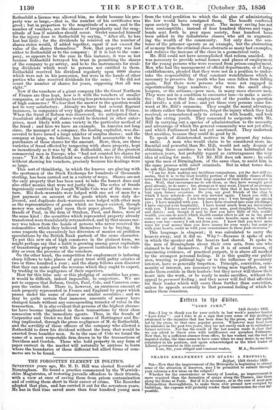111E FORGOTTEN ELEMENT IN POLITICS.
SEVENTEEN years ago, Mr. M. D. Hill was elected Recorder of Birmingham. He found a practice commenced by the Warwick- shire Magistrates, of restoring juvenile offenders to their friends, with a view at once of saving them from prison contamination and of cutting them short in their career of crime. The Recorder adapted that plan, and has carried it out for the seventeen years. He has in that time saved more than four hundred young men
from the total perdition to which the old plan of administering the law would have consigned them. The benefit conferred upon society has been very great. The money saving has not been contemptible; instead of four hundred thieves and vaga- bonds sent forth to prey upon society, four hundred have been added to the industrious classes who aid in augment- ing the wealth of the community. Not only does the sen- tence of the prisoner operate as an example, but the abstraction of so many from the criminal class abstracts so many bad examples, and reduces the increase of the class in a geometrical ratio.
Mr. Hill could not have accomplished that reform unaided. It was necessary to provide actual homes and places of employment for the young persons who were rescued from prison-employment. Men who had the management of official departments, or of large establishments, pleaded that they were not in a position to under- take the responsibility of that constant watchfulness which is necessary to preserve the youth who has once fallen from falling again. But there were persons who were not engaged in superintending large numbers ; they were the small shop- keepers, or the artisans—poor men, in many eases obscure men. They were not in a condition to encounter loss—to make a sacri- fice : they knew that the employment of the youths in question did involve a risk of loss; and yet those very persons came for- ward at Mr. Hill's summons. They sought the moral advantage to others rather than themselves, forgot the injury which they had received, or remembered only to return it with benefit, and took back the erring youth. They consented to cooperate with Mr. Hill in carrying out a species of administration to the necessity and advantage of which the general community was not yet alive, and which Parliament had not yet sanctioned. They undertook that sacrifice, because they could do good by it. To speak of disinterested motives in the present day raises a smile. A man who would claim to be considered more in- fluential and powerful than Mr. Hill, would not only despair of obtaining those sacrifices to which he has been habituated for seventeen years, but probably regard as extravagances the very idea of asking for more. Yet Mr. Hill does ask more ; he calls upon the men of Birmingham, of the same class, to assist him in the same process with adult criminals. But in what terms does he ask this larger sacrifice ? "I am far from making any invidious comparisons, yet the fact still re- mains, that it is to the least wealthy portion of the middle classes of this town ;hat the reclamation of that large number of their fellow creatures is due. Well, that encourages me to ask them, as they have wrought great good already, to do more ; for, strange as it may seem, I know of no stronger hold over the human heart for benevolence than that it has been benevo- lent upon former occasions. Do you, my good friends of the class to which I have referred—do you step forward again. I know you will; I know you thoroughly. I was born among you ; I was brought up among you ; I have mingled with you. I have been received into your dwellings; I have enjoyed your hospitality. I have learnt much from my intercourse with you. I honour and respect you, good sons good daughters, brothers, and sisters ; and, though it may be that you have little of this world's wealth, you can do much which wealth cannot effect to aid us in the great cause we are embarked in. You can confer benefits upon us which no money can buy—money I ask not from you. I know that you have more ways for your money than you have money for your ways; but assist us with your hearts, assist us with your countena PP to these poor creatures."
This language is eloquent; it was calculated to carry the hearers away, and it did. so. Why ?—Because it spoke of acts in which the speaker and the hearers had shared. It spoke to the men of Birmingham about their own acts, from one who claimed to be of themselves. Full as it is of sound reason, of convincing evidence, of practical purport, it is above all marked by the strongest personal feeling. It is this quality our public men, trusting to political logic or to the influence of pecuniary interest, have so generally forgotten. Principle, conviction, com- munity of interest, are necessary to bring men together, and to make them confide in their leaders : but they never will throw their heart into the work, or be ready to make sacrifice, without the appeal to _personal feeling ; and they never will feel affection for their leader which will carry them further than conviction, unless he appeals avowedly to that personal feeling of which he makes them conscious.


























 Previous page
Previous page